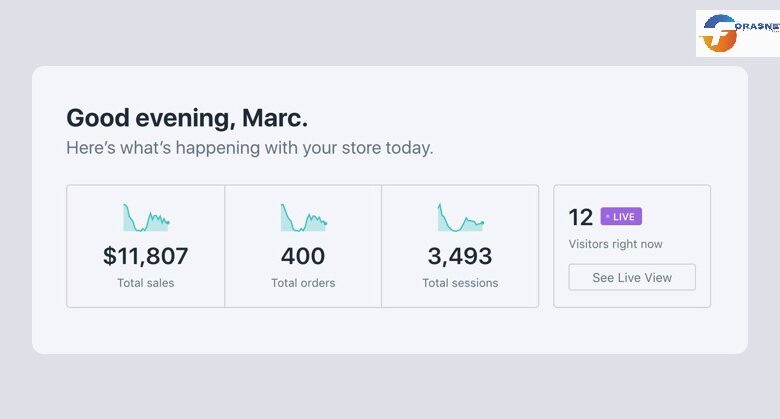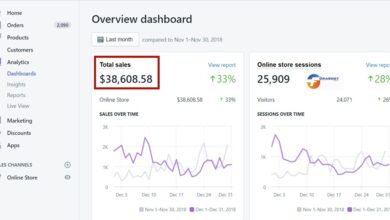Best 7 dropshipping platforms 2023

Best 7 dropshipping platforms 2023 .. Dropshipping is a type of eCommerce where the retailer does not stock or carry inventory themselves. Instead, they act as a middleman between the customer and the supplier. The retailer then takes a commission from each sale.
Dropshipping has become very popular over the last decade because it allows retailers to sell their products without having to invest in expensive retail space. This means that anyone can start selling their products online through dropshipping platforms.
Dropshipping has also gained popularity due to its low startup costs. Many dropshippers choose to operate out of home offices rather than brick and mortar stores. This makes it easier for them to scale their businesses.
Here are the best dropshipping platforms
1. Shopify
Shopify is a great platform for e-commerce stores. You can easily set up an online store using their drag and drop interface and start selling products right away. There are tons of themes and add-ons to customize your website any way you want.
What’s great about Shopify?
The best thing about Shopify is that you don’t have to invest in inventory or warehouse space. If you want to sell your products online, you can use Shopify. And if you want to sell offline later, you can still use Shopify.
What else does Shopify offer?
You can create your own store, manage your orders, view reports, track sales, and much more using Shopify.
Who uses Shopify?
People who want to sell their products online, including entrepreneurs, small businesses, creative professionals, and brands. People who want to sell both online and offline use Shopify.
Is Shopify free?
Yes, Shopify is completely free to use. There are no limits to how many products you can sell, how often you can sell them, or how much money you can make.
Are there costs associated with using Shopify?
There are no upfront fees to set up your store. However, you’ll pay a monthly fee to keep your store active.
Can I sell physical goods on Shopify?
Yes, you can sell physical items on Shopify. You just won’t be able to ship those items directly to customers. Instead, they’ll have to pick them up at a local location.
How to sing up Shopify?
Shopify is a platform where you can sell physical products online. You can create your own store or use someone else’s store. There are many different ways to make money using Shopify. Here are some of them:
– Selling digital downloads
– Selling physical goods
– Selling services
– Membership sites
– Affiliate marketing
– Dropshipping
To start selling on Shopify, you need to sign up first. Then you’ll have to choose what type of account you want to create. Choose between a free account and paid account. If you’re just starting out, I recommend choosing the free account. That way you won’t spend any money at all. But if you plan to sell lots of products, then go for the paid account instead.
After you’ve created your account, you’ll have to log in. When you log in, you get to pick a theme for your website. Pick something that looks good and makes sense. Then you’ll have to add products to your store. Add products by clicking on the ‘Add product’ button right above the page.
You can add products from Shopify’s marketplace. From there, you can search for products to add to your store. You can also upload products directly from your computer.
Once you’ve added products to your store, you’ll have to set their prices. Set the price according to how much you think people will pay for the product.
Next, you’ll have to decide whether you want to offer free shipping or not. Many customers don’t mind paying extra for shipping. So if you want to attract more customers, you should consider offering free shipping.
You can sign up for Shopify for free. Once you’re ready to start selling, Shopify offers three pricing plans: Start Free, Premium, and Enterprise. Start Free gives you everything you need to sell online without paying anything upfront. Premium includes advanced features like unlimited products, theme customization, and 24/7 technical support. Finally, Enterprise gives you access to even more powerful tools like custom domains, mobile apps, and multi-user accounts.
2. BigCommerce
BigCommerce is another popular option for online stores. It offers similar features as Shopify, including a simple drag and drop interface and plenty of customization options.
1. BigCommerce provides a turnkey e-commerce solution for businesses who want to sell online.
2. You can start selling immediately without having to build out any infrastructure.
3. Your customers can browse your products, add them to their cart, checkout with PayPal, and get shipped free worldwide.
4. help you manage inventory, automate order fulfillment, send email marketing campaigns, track orders and payments, and provide customer service 24/7.
3. Volusion
Volusion is a third choice for online stores. It’s a bit different than the others since they offer both subscription plans and a traditional pay per sale model.
1. Volusion is a cloud-based eCommerce solution designed specifically for small businesses. It offers a variety of features including online store management, inventory control, customer relationship management, marketing tools, and payment processing.
2. Volusion’s business model is based on subscription fees. As a result, they offer a free plan for those who want to try out their service before paying anything. If you decide to upgrade to a paid plan, you can choose between three different pricing options: monthly, yearly, and lifetime.
3. A basic plan starts at $9 per month and includes unlimited products, customers, orders, and downloads. You can add additional plans starting at $19 per month. These plans include various features depending on what you need.
4. Volusion offers a 30 day money back guarantee if you’re not satisfied with the product.
5. Their website is simple to use, and navigation is intuitive. There are plenty of videos and tutorials that help you get started.
6. Volusion provides excellent customer service. They have live chat and email support 24/7.
7. Volusion is a great option for anyone looking for a reliable eCommerce solution.
4. Woo Commerce
Woo Commerce is a free open source solution for online stores. It is simple to use and has many customizable options.
WooCommerce is a free WordPress e-commerce plugin that makes it super simple to sell products online. You don’t need any programming knowledge to use WooCommerce. In fact, it’s so user friendly that even beginners can get started right away.
Here’s how to set up your store using WooCommerce:
1. Install WooCommerce
Search for WooCommerce and install it. Click Activate Plugin.
2. Create a Product
Give your product a name and description. Then select the category where you want to place your product. Finally, add images and choose whether or not you’d like to have a price tag.
3. Set Up Your Store
Now that you’ve created your first product, it’s time to create your storefront. Theme Name – Select a theme that matches your brand.
Header Image – Upload a logo image to appear at the top of your site.
Footer Text – Enter some text below your header image.
WooCommerce is an open-source ecommerce plugin for WordPress. It is free to use and is compatible with almost any type of website. It is highly customizable and comes with many features including product import/export, tax calculations, shipping options, custom checkout pages, and much more. WooCommerce is extremely popular among online stores and is supported by thousands of plugins and themes.
4. WooCommerce Marketplace
The WooCommerce marketplace is a feature built directly into the WooCommerce plugin. It allows users to sell their products directly from their store without having to go through third party marketplaces. Products can be sold individually or grouped together into collections. Collections can then be promoted to increase visibility and sales.
5. WooCommerce Product Add-Ons
Product add-ons allow customers to purchase additional items at a discount. These add-ons are similar to coupons and only work if they match the customer’s current cart.
6. WooCommerce Shipping Options
Shipping options allow customers to choose between different shipping methods based on the destination of their order. Customers can select from standard USPS mail, FedEx, UPS, DHL, or TNT.
7. WooCommerce Tax Calculations
Taxes are calculated automatically using the user’s location and currency. Taxes can be applied to orders before they are shipped or after they have been delivered.
8. WooCommerce Customer Reviews
Customer reviews allow customers to leave feedback about their experience with your business. You can display these reviews on your storefront and even respond to them.
9. WooCommerce Order Tracking
Order tracking allows customers to track their order from start to finish. They can view the status of their order at any time and receive updates via email.
5. PrestaShop
Prestashop is a powerful open source solution for online shops. It offers lots of features for online stores and comes with a free plan.
1. Sign Up
Signing up for Prestashop is simple. Once you have signed up, you will receive an email confirmation containing your username and password.
2. Login
Once you have logged in, you will see the dashboard where you can manage your store.
3. Add New Product
You can add products to your shop by clicking on “Add New” at the top right corner of the page.
4. Edit Products
If you want to edit any product information, click on the pencil icon beside the product name.
5. Delete Products
To delete a product, simply select the product and then click on the trashcan icon.
6. Change Password
Click on the “Change Password” link located at the bottom left corner of the page. Enter your current password and then enter a new password twice. Click on “Update Password” to confirm the changes.
7. Contact Us
If you have any questions about how to use Prestashop, feel free to contact us using our website’s contact form.
6. OpenCart
Opencart is a robust open source solution for online shopping carts. It is feature rich and highly customizable.
1. Opencart
Opencart is a free open-source eCommerce platform designed specifically for small businesses and individuals. It is built using PHP/MySQL and uses a MVC design pattern. It is highly customizable and extendable.
1. Opencart Sign Up
Signing up for an opencart store is super simple. Once you have signed up, you’ll receive an email with login information.
2. Login Information
Login information is sent via email after signing up. To get access to your account, click on the link provided in the email.
3. Account Dashboard
The dashboard is where you manage your products, categories, orders, customers, etc. If you’re not logged in, you’ll be taken to the login page.
4. Products Page
This is where you add products to your store. Click on the Add Product button at the top right corner of the screen.
5. Categories Page
Categories are what make your store unique. You can create as many categories as you’d like. When adding a category, you’ll be asked if you want to use a dropdown menu or text input box. Choose whichever works best for you.
6. Orders Page
Orders allow you to keep track of your inventory. You can view your current order status, edit your order details, and cancel your order.
7. Customers Page
Customers are people who purchase items from your store. You can view their shipping address, billing address, payment method, and order history.
7. Zen Cart
Zen Cart is a free open-source content management system (CMS) designed specifically for eCommerce websites. Zen Cart was created by Zen Software Ltd., a company based in the United Kingdom. Zen Cart is a web application that runs on PHP 5.x and MySQL 4.x. Zen Cart uses a modular design, making it possible to add modules without having to modify core files.
Zen Cart is a fully featured eCommerce solution that includes a shopping cart, order processing, product catalog, customer account management, newsletter subscription, and much more.
Zen Cart supports many different payment gateways including PayPal, Google Checkout, Authorize.net, WorldPay, 2CheckOut, Paypal Express, and others.
Zen Cart comes with a built-in search engine optimization tool called SEO Manager. You can use this tool to optimize your website’s meta tags, title tag, description tag, keywords, etc.
Zen Cart offers a number of features that make it stand out from other CMS solutions. These include:
a. A powerful admin panel that makes managing your site simple and straightforward.
b. An intuitive user interface that makes adding products and editing pages fast and easy.
c. A flexible layout that lets you customize your site however you want.
d. Support for both left and right sidebars.
e. Built-in RSS feeds that allow you to syndicate news items from your site to blogs and social networking sites.
f. A wide variety of themes and skins.
g. A robust plugin architecture that enables developers to create their own extensions.
h. A comprehensive documentation set that covers everything from installation to advanced topics.
i. A community forum where users can ask questions about using Zen Cart and share tips and tricks.
Read More : Successful Affiliate Marketing Methods


